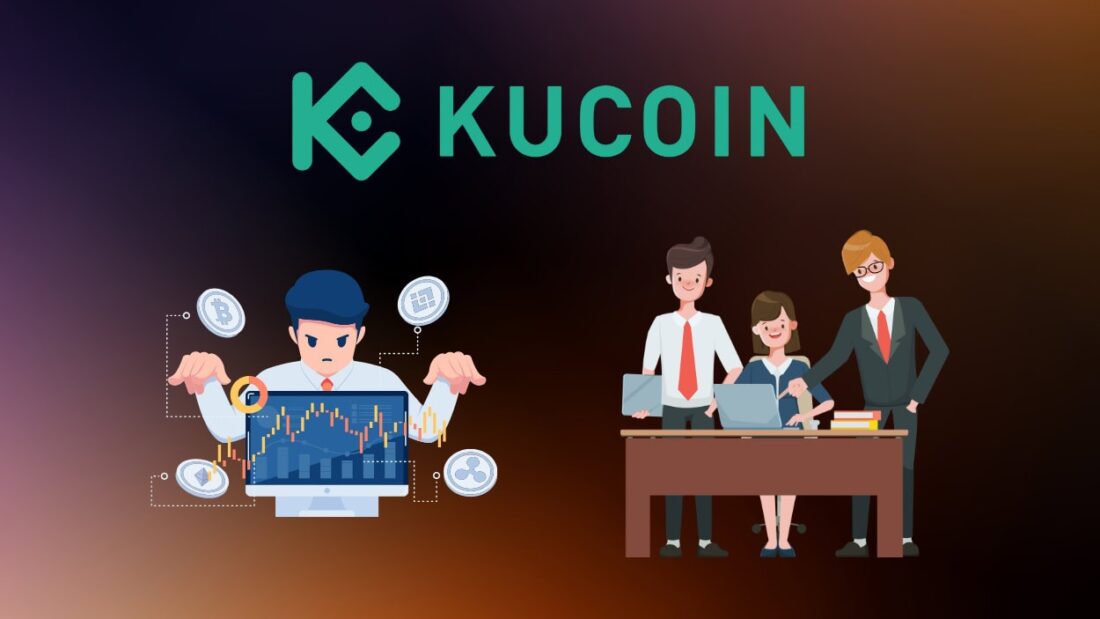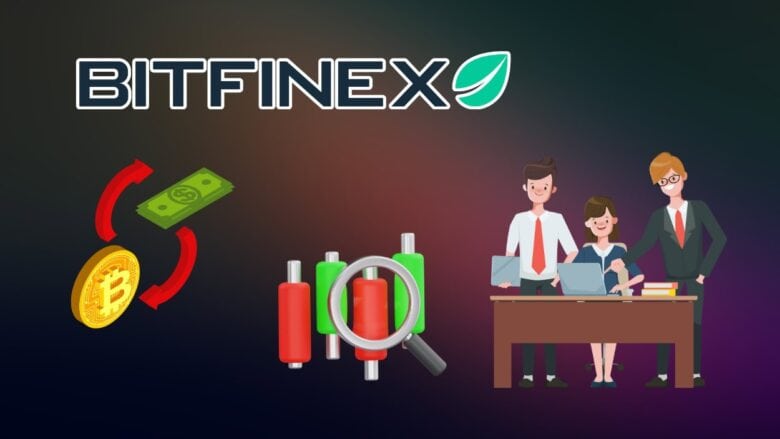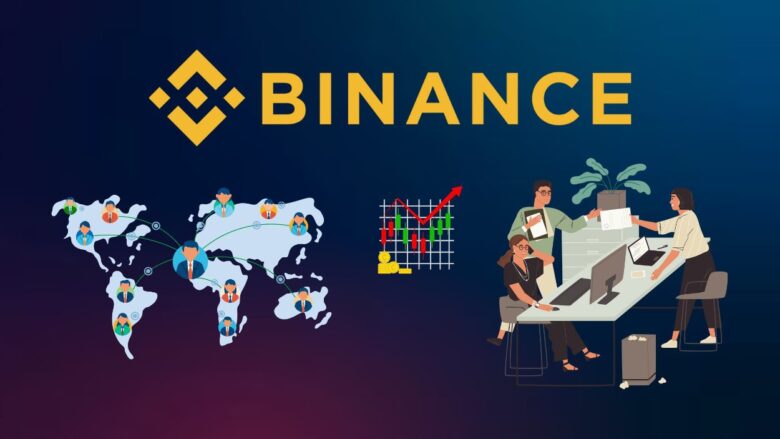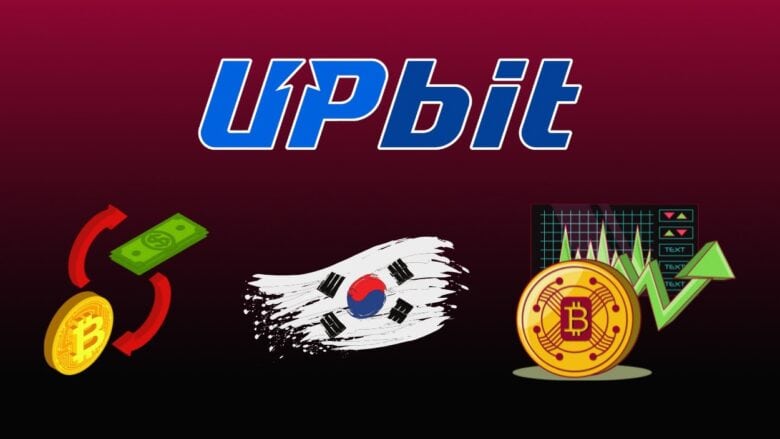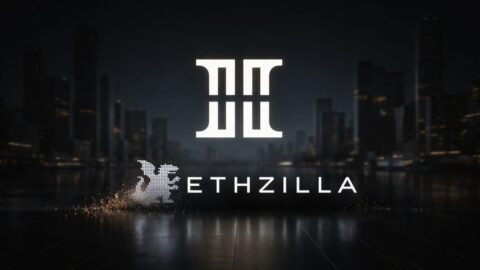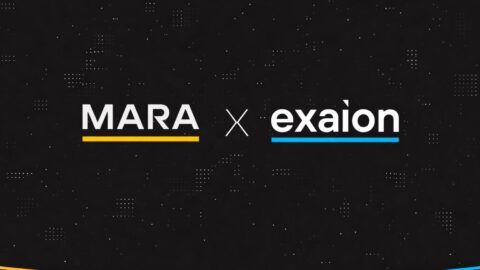The global cryptocurrency exchange KuCoin has grown rapidly since its launch in 2017, raising important questions about how many people now work there and how the organization manages its workforce. As KuCoin expands into new markets and launches adjacent services such as payments and tokenized equities, workforce planning and staffing become critical.
For example, in a trading-platform scenario, the number of engineers needed to develop new products can scale faster than support staff, while in a regulatory-compliance scenario, the firm must hire specialists across jurisdictions. This article presents in-depth statistics on KuCoin’s workforce, offices, and structure, inviting readers to explore the full breakdown ahead.
How Many People Work At KuCoin?
- KuCoin is estimated to have approximately 859 total employees.
- KuCoin announced over 41 million registered users in H1 2025, showing the workforce must support that scale.
- A survey in April 2024 showed 88% of participants were eager to build careers in blockchain, relevant to KuCoin’s hiring pipeline.
- Glassdoor data show that only 25% of employees would recommend KuCoin to a friend, with a rating of about 2.5/5, suggesting workforce sentiment issues.
- The company has confirmed at least 1 office location in Mahé, Seychelles.
Recent Developments
- In the first half of 2025, KuCoin exceeded 41 million registered users, marking a significant growth milestone.
- KuCoin secured both SOC 2 Type II and ISO 27001:2022 certifications in 2025, signaling investment in security and compliance staffing.
- The company launched a $2 billion Trust Project in 2025 to bolster platform security, creating staffing implications for custody, auditing, and risk functions.
- KuCoin applied for a MiCAR licence in the EU and supported the launch of KuCoin Thailand under Thai SEC regulation, expanding its global footprint.
- Remote work and global teams are emphasized in KuCoin’s Careers page: “Remote work with a global team” is cited explicitly.
- Internal reports show KuCoin onboarded more than 300 new team members in H1 2023, suggesting accelerating headcount growth.
KuCoin Price Comparison
- Bitcoin (BTC) reached a price of $114,491 in 2025, with a market cap of $2.28 trillion and a YTD gain of +20.1%. This positions Bitcoin as the #1 ranked asset on KuCoin, reflecting steady institutional demand and macro-driven confidence in digital assets.
- S&P 500 Index climbed to 6,643.91 points, marking a +12.2% year-to-date gain. Although not a crypto asset, its inclusion highlights how traditional markets continue to show moderate strength compared to digital assets listed on KuCoin.
- PAX Gold (PAXG) surged to $4,110.82 per token, achieving an impressive +56.3% YTD growth and a market cap of $1.26 billion. Ranked #66 on KuCoin, it underscores growing investor preference for tokenized gold as a hedge against volatility.
- The YTD chart (Jan–Oct 2025) shows PAX Gold leading performance gains at +54.5%, followed by Bitcoin at around +25.4%, while the S&P 500 maintained a steady +10.9% increase.
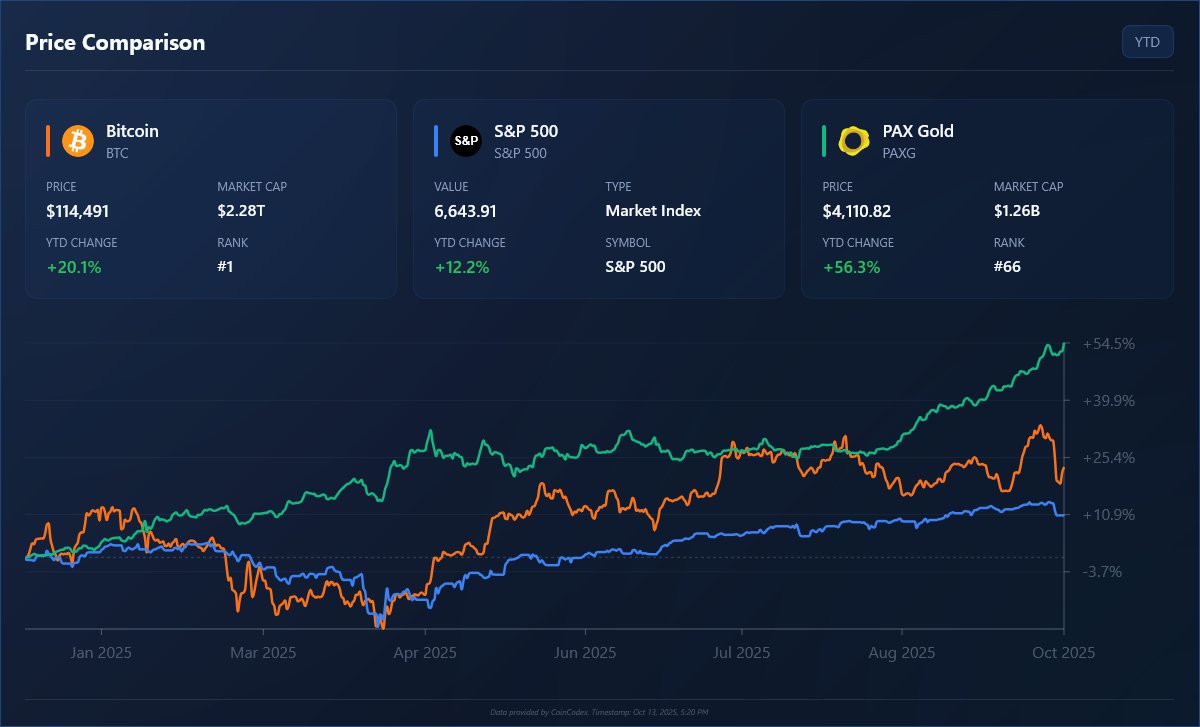
KuCoin’s Current Team (Key People)
- BC Wong (Chief Executive Officer). Appointed CEO in January 2025, Wong brings deep legal and regulatory experience, previously serving as KuCoin’s Chief Legal Officer. He emphasises user-centric design, global compliance, and secure platform growth.
- Johnny Lyu (Co-Founder & Chief Executive Officer of KuCoin EU/Global Advisor). Lyu co-founded KuCoin in 2017 and continues to provide strategic guidance for global expansion and innovation efforts.
- Kent Li (Co-Founder & Director of Operations & Maintenance). Li manages key operational infrastructures, ensuring the exchange platform remains stable, scalable, and responsive.
- Larry He (Managing Director). He oversees a variety of business development initiatives, partnerships, and ecosystem launches to drive global growth.
- Top Lan (VP & CTO). Responsible for technology strategy, architecture, and engineering teams, Lan leads innovation in product features, exchange performance, and infrastructure reliability.
- Christian Derler (Chief Commercial Officer, KuCoin EU). With over 20 years in banking and private wealth management, Derler leads business development, sales, and regional growth for KuCoin’s European entity.
- Tamara Rubey (General Counsel, KuCoin EU). A former payments-and-crypto legal specialist, Rubey manages legal, regulatory, and payment-services oversight for KuCoin’s European operations.
Global Offices and Locations
- KuCoin states it is trusted by over 41 million users across more than 200 countries and regions.
- In 2022, KuCoin announced plans to create around 200 new positions in Hong Kong, Bangkok, Singapore, and Dubai.
- KuCoin’s global workforce is increasingly diverse, with remote and regional staff playing an expanding role.
- In 2022, KuCoin’s trading volume exceeded $2 trillion, with a daily peak of $11 billion in spot trading.
- The platform’s daily futures trading volume reached nearly $23 billion in May 2022.
- KuCoin’s user base grew by over 13 million in 2022, increasing total users to 27 million.
- KuCoin continues its “Glocal” expansion strategy, actively establishing regional hubs in Dubai, Hong Kong, and other regions, with about 200 new jobs planned.
Hiring Trends and Expansion Plans
- KuCoin’s career listings in 2025 show 60+ open roles worldwide.
- In Singapore, about 99 jobs are posted as of November 2025, revealing Southeast Asian expansion.
- In Malaysia, roughly 100 roles were listed, highlighting APAC hiring growth.
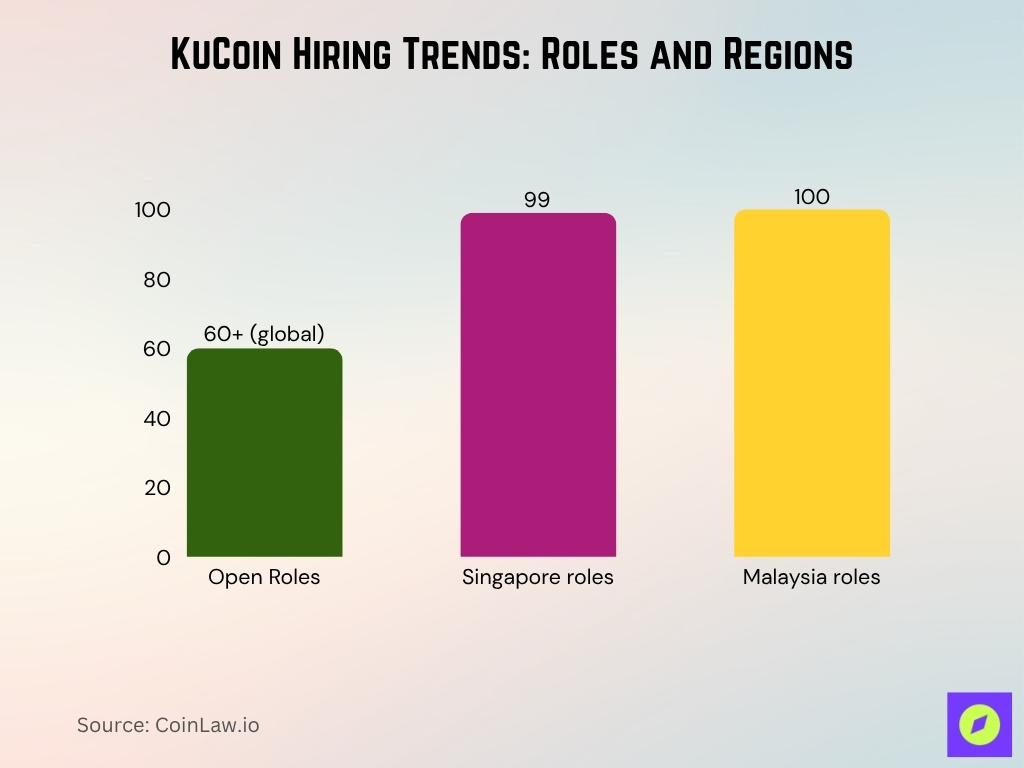
- KuCoin’s mid-2025 update cited new markets in Latin America and MENA, requiring localized teams.
- Despite hiring, crypto salaries dropped across roles, with only 10% entry-level positions, affecting cost structures.
- KuCoin lists flexible benefits like biannual promotions, remote work, and work visa support.
- The firm’s expansion into regulated regions like Thailand creates new compliance job demands.
- Overall hiring trends show a shift from engineering-heavy roles to compliance and regulatory staff.
KuCoin vs. Competitors: Workforce Comparison
- KuCoin has approximately 859 employees as of 2025, after growing its workforce by 18% last year.
- Coinbase had about 3,772 employees by the end of 2024, rising to 4,279 employees in mid-2025.
- Binance employed over 5,300 people worldwide as of Q1 2025, with a compliance team of 645+ staff.
- Binance’s workforce grew from around 3,000 in 2021 to nearly 8,000 in 2022, showing rapid expansion relative to KuCoin.
- Many crypto companies, including KuCoin, engage contractors and offshore staff, making direct headcount comparisons less straightforward.
- With over 41 million users, KuCoin achieves high operational efficiency despite a smaller staff versus larger competitors.
- Coinbase’s revenue per employee was about $1.74 million in 2024, reflecting scale advantages missing in smaller peers like KuCoin.
Employee Demographics at KuCoin
- Industry data suggest a 76% male workforce in blockchain and about 95% white demographics in prior surveys.
- The April 2024 campus survey of 1,944 respondents found 88% want blockchain careers, implying a young pipeline.
- Most KuCoin staff are likely based in Asia, Latin America, and MENA rather than the U.S. or Europe.
- The remote model supports greater participation from underrepresented regions.
- Salary data showing only 10% entry-level indicates a workforce leaning towards mid-to-senior level.
- Demographic transparency remains limited but should improve as the firm matures.
Salary and Compensation Insights
- KuCoin roles include Global Marketing at $149,000-$267,000, Business Development at $109,000-$198,000, Derivatives Trader at $115,000-$215,000, Social Media Manager at $50,000-$92,000, and Community Manager at $54,000-$97,000.
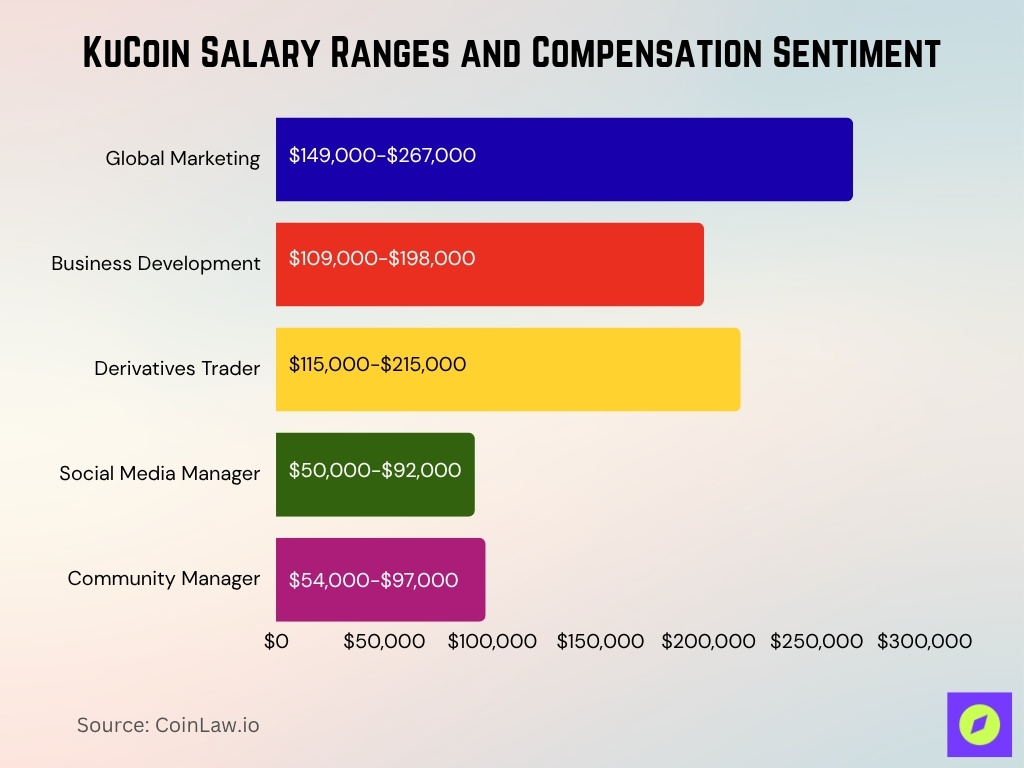
- The compensation satisfaction score is 3.1/5, reflecting average sentiment.
- Across crypto companies, average pay dropped by 18% year-over-year to about $144,000 in 2024/2025.
- Only 10% of roles in the crypto market are entry-level, raising the average pay band.
- KuCoin confirmed the same 10% entry-level ratio in its 2025 Flash release.
- Pay is location-adjusted, varying widely between Southeast Asia and Western markets.
- Many crypto firms, including KuCoin, pay partial bonuses in digital assets such as Bitcoin or Ethereum.
Diversity in KuCoin’s Workforce
- KuCoin’s blockchain-related technical staff female representation likely aligns with the industry average of 4%-6%.
- In KuCoin’s April 2024 campus survey, 88% of participants expressed eagerness to build careers in blockchain.
- KuCoin operates remotely with a global team spanning 200+ countries, reflecting geographic inclusivity.
- KuCoin’s remote hiring enables recruitment from varied socioeconomic backgrounds.
- The crypto sector generally skews male-dominant, with women comprising less than 30% of the workforce in 2025.
- KuCoin’s Web3 report notes that 60% of female professionals believe they uniquely contribute to improving workplace culture in crypto.
Job Listings and Open Positions at KuCoin
- As of late 2025, KuCoin has around 100 open roles in Malaysia.
- KuCoin’s Careers page lists openings in product, operations, compliance, marketing, and engineering globally.
- Heavy recruitment focus in Southeast Asia reflects a cost-effective growth strategy targeting the APAC region.
- Many open positions are offered as remote or hybrid, accommodating multiple time zones.
- Entry-level roles constitute about 10% of industry jobs, consistent with KuCoin’s limited junior hiring.
- KuCoin’s global job distribution aligns with its worldwide user base, exceeding 41 million users.
Top 10 Ecosystems by New Developers
- Ethereum leads with 16,181 new developers joining its ecosystem in 2025, underscoring its dominance on KuCoin’s developer-focused listings. This includes Layer-1 and Layer-2 rollups that continue to attract major smart-contract and DeFi builders.
- Solana added 11,534 new developers, reflecting its strong growth in high-performance blockchain projects traded on KuCoin. Its developer surge shows sustained interest in fast transaction environments and NFT-friendly dApps.
- Bitcoin drew 7,494 new developers, showing steady momentum as KuCoin lists more Bitcoin-based innovations, including Ordinals and Layer-2 extensions such as Lightning and Stacks.
- Polygon attracted 3,681 new developers focused on scalability and cross-chain interoperability. This aligns with KuCoin’s listings of Polygon-based tokens and its role in low-fee DeFi expansion.
- Stacks recorded 3,246 new developers, illustrating growing attention to Bitcoin-layer development and smart contract activity backed by KuCoin-supported assets.
- Sui gained 3,179 new developers, confirming rising adoption of next-generation Move-based protocols, with KuCoin actively listing Sui-powered tokens during 2025.
- Internet Computer onboarded 2,667 new developers, reinforcing KuCoin’s diversified listing of Web3 infrastructure tokens, driving decentralized computing.
- BNB Chain added 2,511 developers, highlighting Binance-linked ecosystems’ resilience and KuCoin’s role as an alternative exchange for BNB-based assets.
- Stellar welcomed 2,226 new developers, reflecting renewed interest in payments and stablecoin networks that KuCoin frequently lists for cross-border utility.
- Aptos attracted 1,938 developers, completing the top-10 ranking, with KuCoin spotlighting its rapid evolution in the Layer-1 landscape and expanding Move-language adoption.
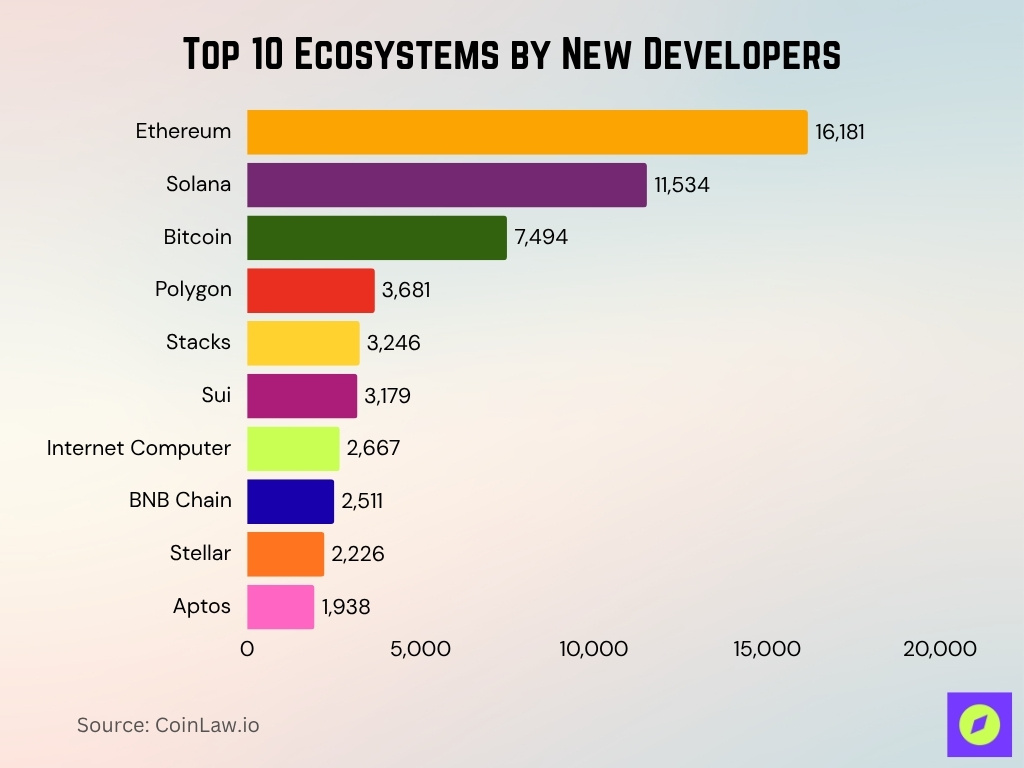
Awards and Industry Recognition
- KuCoin won the 2025 Corporate Social Responsibility Award from the UN Women Organization in April 2025.
- Its brand film earned 1 Platinum and 2 Gold awards at the 2025 MUSE Creative & Design Awards, chosen from over 13,000 entries.
- KuCoin’s H1 2025 review highlighted “Building Trust, Driving Innovation” as a key theme.
- The platform reached over 41 million users by mid-2025, reflecting strong global trust.
- KuCoin’s ongoing CSR initiatives impacted 50,000 lives worldwide through solar lamp and menstrual kits distribution.
- KuCoin earned an AAA security rating from CER.live, ranking among the top four most secure exchanges globally.
Corporate Social Responsibility and ESG Initiatives at KuCoin
- KuCoin’s CSR work includes major projects such as Light Up Africa, Menstrual Equality, and Climate Change Buckets.
- In “Light Up Africa”, 2,500 solar lamps were donated to 25 Nigerian schools, later expanding to 7,200 lamps across Ghana, Sierra Leone, and Nigeria.
- The “Menstrual Equality” campaign distributed 1,000 reusable kits early in 2024 and 4,000 more by year-end.
- Combined CSR programs benefited nearly 50,000 women and children globally.
- KuCoin frames CSR under its mission of “technology for dignity,” aligned with UN SDGs.
- These initiatives strengthen KuCoin’s image as a responsible tech company.
- The CSR focus attracts employees who value purpose-driven organizations.
- Dedicated CSR and sustainability teams likely exist internally to manage projects.
- KuCoin’s ESG stance positions it ahead of many crypto competitors on social impact.
Frequently Asked Questions (FAQs)
Only about 10% of roles were classified as entry-level.
Over 41 million registered users were reported worldwide.
Female representation in technical staff is typically around 4%–6%.
Conclusion
Understanding how many people work at KuCoin, and what drives their roles, compensation, and global footprint, matters for talent, investors, and anyone following the crypto ecosystem. The data show KuCoin operates with a lean but globally distributed workforce, offers competitive pay for mid-senior roles, and emphasizes regional expansion, social responsibility, and brand recognition. For U.S. audiences comparing exchanges, KuCoin stands out with a smaller staff yet broader reach and high efficiency. As the industry evolves, monitoring KuCoin’s employee growth, revenue per employee, hiring mix, and CSR impact will remain crucial for evaluating its strategic direction.


